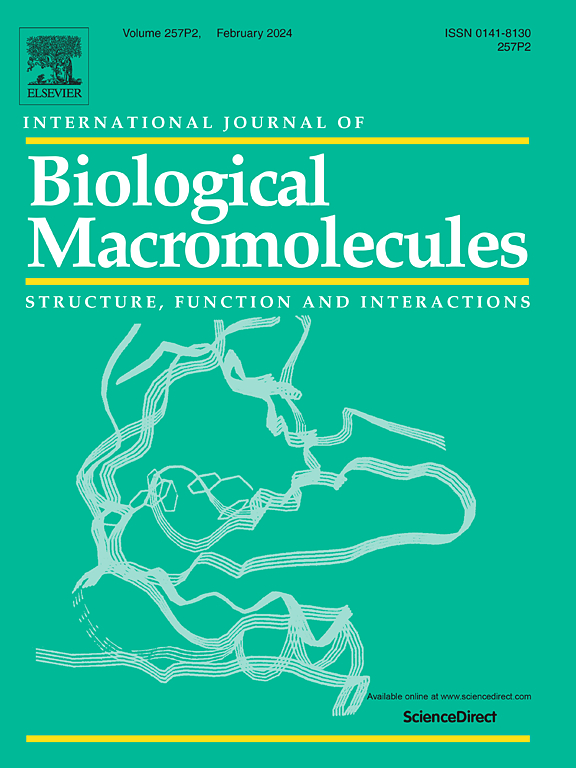给药时间通过肠脑轴改变菊粉的抗焦虑和抗抑郁作用。
IF 7.7
1区 化学
Q1 BIOCHEMISTRY & MOLECULAR BIOLOGY
International Journal of Biological Macromolecules
Pub Date : 2025-02-01
DOI:10.1016/j.ijbiomac.2024.138698
引用次数: 0
摘要
微生物-肠-脑轴失衡对抑郁症和焦虑症的病理生理有重要影响。我们之前的研究表明,菊粉给药的时间改变了其对慢性不可预测的轻度应激(CUMS)诱导的焦虑和抑郁的影响。然而,目前尚不清楚肠脑轴是否对这些影响负有主要责任。在这项研究中,粪便微生物群移植(FMT)证实,在不同时间给药菊粉可以通过肠-脑轴缓解cms诱导的焦虑和抑郁样行为。给药时间似乎改变了菊粉的抗焦虑和抗抑郁作用,晚上菊粉干预对炎症反应的抑制作用比早晨菊粉干预更明显。血清代谢组学分析显示,不同剂量菊粉对抗焦虑和抗抑郁作用的主要差异代谢物为非诺纤维酸、4′-羟基非诺洛芬葡萄糖醛酸和5-(4-羟基苄基)噻唑烷-2,4-二酮。我们的研究结果表明,晚上给药菊粉对减轻炎症反应和改善氨基酸代谢更有效。该研究提供了微生物-肠-脑轴与时间营养之间的新的潜在联系,表明更合适的给药时间可以获得更好的干预效果。本文章由计算机程序翻译,如有差异,请以英文原文为准。

Administration time modify the anxiolytic and antidepressant effects of inulin via gut-brain axis
An imbalance in the microbiota-gut-brain axis exerts an essential effect on the pathophysiology of depressive and anxiety disorders. Our previous research revealed that the timing of inulin administration altered its effects on chronic unpredictable mild stress (CUMS)-induced anxiety and depression. However, it is still unclear if the gut-brain axis is primarily responsible for these effects. In this study, fecal microbiota transplantation (FMT) confirmed that inulin administration at different times alleviated CUMS-induced anxiety- and depression-like behaviors via the gut-brain axis. The time of administration seemed to modify the anxiolytic and antidepressant effects of inulin, and inulin intervention in the evening was more pronounced in inhibiting the inflammatory responses than that of morning inulin intervention. Serum metabolomics analysis showed that the main differential metabolites, including fenofibric acid, 4'-Hydroxyfenoprofen glucuronide and 5-(4-Hydroxybenzyl)thiazolidine-2,4-dione may be vital for the anxiolytic and antidepressant effects of different inulin treatment times. Our results suggested that inulin administration in the evening was more effective in alleviating the inflammatory responses and improving amino acids metabolism. This study provides a new potential link between the microbiota-gut-brain axis and chrono-nutrition, demonstrating that a more appropriate administration time results in a better intervention effect.
求助全文
通过发布文献求助,成功后即可免费获取论文全文。
去求助
来源期刊
CiteScore
13.70
自引率
9.80%
发文量
2728
审稿时长
64 days
期刊介绍:
The International Journal of Biological Macromolecules is a well-established international journal dedicated to research on the chemical and biological aspects of natural macromolecules. Focusing on proteins, macromolecular carbohydrates, glycoproteins, proteoglycans, lignins, biological poly-acids, and nucleic acids, the journal presents the latest findings in molecular structure, properties, biological activities, interactions, modifications, and functional properties. Papers must offer new and novel insights, encompassing related model systems, structural conformational studies, theoretical developments, and analytical techniques. Each paper is required to primarily focus on at least one named biological macromolecule, reflected in the title, abstract, and text.

 求助内容:
求助内容: 应助结果提醒方式:
应助结果提醒方式:


